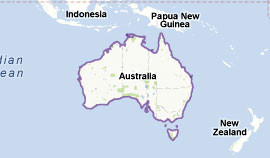‘Lost world’ discovered in remote Australia

Conrad Hoskin from James Cook University and a National Geographic film crew were dropped by helicopter onto the rugged Cape Melville mountain range on Cape York Peninsula earlier this year and were amazed at what they found.
It included a bizarre looking leaf-tail gecko, a golden-coloured skink and a boulder-dwelling frog, none of them ever seen before.
“The top of Cape Melville is a lost world. Finding these new species up there is the discovery of a life time – I’m still amazed and buzzing from it,” said Hoskin from the Queensland-based university.
“Finding three new, obviously distinct vertebrates would be surprising enough in somewhere poorly explored like New Guinea, let alone in Australia, a country we think we’ve explored pretty well.”
The mountain range is home to millions of black granite boulders the size of cars and houses piled hundreds of metres high.
Article continues after this advertisementWhile surveys had previously been conducted in the boulder-fields around the base of Cape Melville, the plateau of boulder-strewn rainforest on top had remained largely unexplored, fortressed by massive boulder walls.
Article continues after this advertisementWithin days of arriving, the team had discovered the three new species as well as a host of other interesting species that Hoskins said may also be new to science.
The highlight was the leaf-tailed gecko, a “primitive-looking” 20 centimeter-long (7.9 inches) creature that is an ancient relic from a time when rainforest was more widespread in Australia.
The Cape Melville Leaf-tailed Gecko, which has huge eyes and a long, slender body, is highly distinct from its relatives and has been named Saltuarius eximius, Hoskins said, with the findings detailed in the latest edition of the international journal Zootaxa.
“The second I saw the gecko I knew it was a new species. Everything about it was obviously distinct,” he said.
Highly camouflaged, the geckos sit motionless, head-down waiting to ambush passing insects and spiders.
The Cape Melville Shade Skink is also restricted to moist rocky rainforest on the plateau, and is highly distinct from its relatives, which are found in rainforests to the south.
Also discovered was a small boulder-dwelling frog, the Blotched Boulder-frog, which during the dry season lives deep in the labyrinth of the boulder-field where conditions are cool and moist.
In the summer wet season it emerges on the surface rocks to feed and breed in the rain.